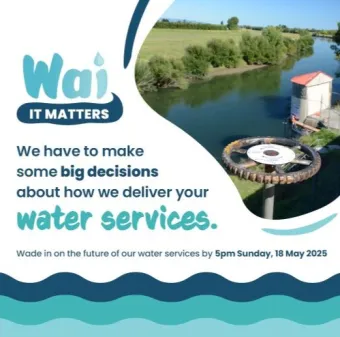Whakatāne District Council is inviting residents to have their say on a proposal that will shape how essential water services, including drinking water, stormwater, and wastewater, are delivered in the future.

Mayor Dr Victor Luca says this is an important decision for our district. “It’s not just about the water we drink, where the rain goes, or what happens when we flush — it’s about ensuring services remain affordable, resilient, and environmentally sustainable for years to come.”
The Government’s new Local Water Done Well legislation replaces the previous Three Waters reform programme. While the end goals remain the same; safe, sustainable, and efficient water services, the new legislation gives councils more flexibility in how to achieve them. All councils are now required to submit a Water Services Delivery Plan by 3 September 2025, either individually or in partnership with others.
Over recent months, Whakatāne District Council staff and expert advisors have reviewed the state of the water infrastructure, assessed future upgrade and maintenance needs, and explored funding options. This detailed work has helped Councillors to shape a shortlist of delivery approaches now open for public feedback.
Mayor Luca says the Council has undertaken a thorough analysis to understand the best way forward.
“We’ve examined what’s needed to meet both the legislative requirements and the specific needs of our district,” he says. “Now, after careful consideration, Councillors have agreed to consult our communities on two shortlisted models for how we deliver water services going forward.”
The two options are:
A Multi-Council-Controlled Organisation (Multi-CCO) – Council’s preferred option. This model involves forming a new, council-owned entity with other local councils. It offers shared resources, expert capability, and greater efficiency, while retaining ownership and governance at the local level.
A standalone business unit within Council – An alternative where the Whakatāne District Council continues to manage water services internally, but with a stand-alone team and structure.
Mayor Luca says financial modelling suggests that joining forces with other councils has marginal benefits in the first 10 years but stronger long-term benefits. He has also stressed that financial modelling relies on assumptions and therefore has uncertainties associated with it.
“Going it alone would appear challenging, although it has the advantage that we have greater control, more autonomy. A collaborative, regional approach could allow us to share costs, build a more resilient workforce, and continue to deliver high-quality services.”
Under the Multi-CCO model, the Whakatāne District Council would jointly own a limited liability company responsible for delivering water services. All water-related assets, revenue, and debt would transfer to the new entity, which would provide services directly to customers under regulatory oversight. The Council would still play a vital role by setting expectations for how local priorities are reflected in decision-making.
“A larger, regionally coordinated organisation is better placed to address the challenges we’re facing,” Mayor Luca says. “Much of our infrastructure is aging — 43 percent of our underground pipes are over 50 years old. Replacing them over the next 30 years will require major investment and a unified effort.”
“This is a long-term strategy — and one that’s best tackled together.”
Community input is essential before any decisions are made.
“We’ve done the groundwork to understand what’s possible,” says Mayor Luca. “Now, we want to hear what our community thinks before finalising the plan. Water services may be out of sight, but they impact our lives every day. We want them to be safe, reliable, environmentally responsible, and affordable, now and into the future.”
It is vital that tangata whenua continue to have meaningful influence over decisions, whether water services are delivered by Council or a new entity. The Council is committed to ensuring strong iwi and hapū relationships are upheld in any future delivery model.
Public consultation opened on Thursday, 17 April and runs until 5pm, Sunday 18 May. Community pop-in sessions are also planned during this time.
To read the proposal, share your views, or for more information, visit koreromai.whakatane.govt.nz/wai-it-matters